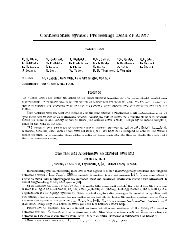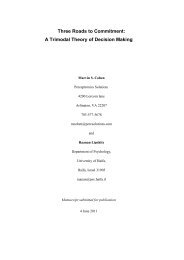Three Roads to Commitment: A Trimodal Theory of Decision Making
Three Roads to Commitment: A Trimodal Theory of Decision Making
Three Roads to Commitment: A Trimodal Theory of Decision Making
Create successful ePaper yourself
Turn your PDF publications into a flip-book with our unique Google optimized e-Paper software.
<strong>Three</strong> <strong>Roads</strong> <strong>to</strong> <strong>Commitment</strong>: A <strong>Trimodal</strong> <strong>Theory</strong> <strong>of</strong> <strong>Decision</strong> <strong>Making</strong> 66<br />
Matching Choice Reassessment<br />
Starting commitment No COA Disjunction <strong>of</strong> mutually<br />
exclusive COAs<br />
A single COA<br />
Implicit framing<br />
question<br />
What should a person in<br />
my role do in this kind <strong>of</strong><br />
situation<br />
Which option is the best<br />
means <strong>to</strong> my ends<br />
Is my current course <strong>of</strong><br />
action reliable<br />
Grounds (focus <strong>of</strong><br />
attention)<br />
Present situation and<br />
decision maker role<br />
Future outcomes <strong>of</strong><br />
available options<br />
Past performance <strong>of</strong><br />
current COA<br />
Claim (commitment<br />
change if successful)<br />
Add a COA Select a COA Retain or reject a COA<br />
Warrant (why grounds<br />
are relevant)<br />
COA is appropriate for<br />
someone in my role in this<br />
kind <strong>of</strong> situation.<br />
COA is at least as efficient<br />
a means <strong>to</strong> my ends as any<br />
other available option.<br />
Reject COA that failed<br />
challenges in similar<br />
situations; otherwise,<br />
retain.<br />
Backing (normative basis<br />
<strong>of</strong> warrant)<br />
Duty: Personal policies,<br />
group norms, universal<br />
ethical principles<br />
Instrumental rationality:<br />
Consistency among<br />
outcome preferences,<br />
outcome forecasts, and<br />
action choices<br />
Trial and error:<br />
Incremental variation and<br />
selective retention <strong>of</strong><br />
successes as a basis for<br />
reliable innovation<br />
Intrinsic rebuttals <strong>to</strong><br />
claims (characteristic<br />
potential errors)<br />
1. Situation or role has<br />
changed.<br />
2. Certain duties conflict<br />
in this situation or in<br />
general.<br />
Beliefs or preferences<br />
regarding outcomes were<br />
assessed incorrectly due <strong>to</strong><br />
limited knowledge.<br />
Testing process was <strong>to</strong>o<br />
restricted in scope or nonrepresentative<br />
<strong>of</strong> current<br />
situation.<br />
Rebuttals <strong>to</strong> the solutions<br />
generated in other modes<br />
Choice and reassessment<br />
endorse actions that<br />
conflict with expertise,<br />
ethics, cooperation, selfcontrol,<br />
and inherited<br />
wisdom.<br />
Matching and<br />
reassessment fail <strong>to</strong><br />
optimize due <strong>to</strong> bias in<br />
favor <strong>of</strong> the status quo and<br />
failure <strong>to</strong> consider all<br />
possibilities.<br />
Choice and matching yield<br />
unintended consequences<br />
in novel situations because<br />
they do not test hidden<br />
assumptions or adapt <strong>to</strong><br />
their failure.




